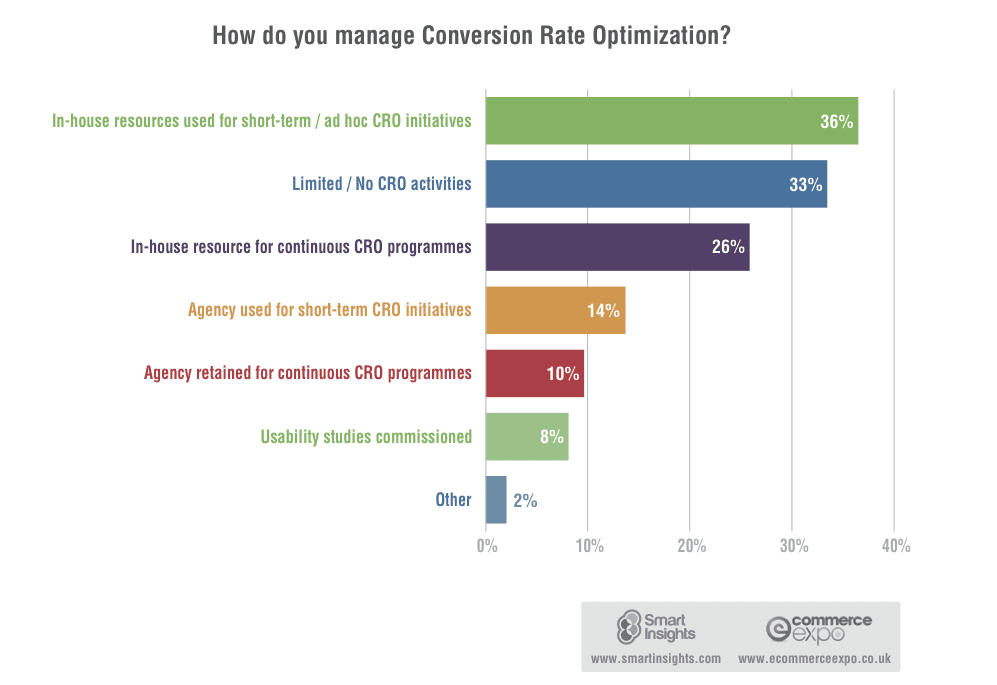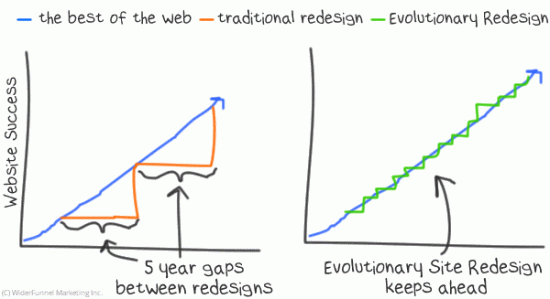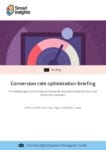A review of the costs and benefits of more investment in CRO / analytics
According to the Customer Journeys research we conducted with the eCommerceExpo conference, surprisingly few business are actively involved in CRO - 33% of companies have limited or zero conversion rate optimisation (CRO) activity. Instead, it seems that many people / business are opting for reinvention every few years and focussing on other marketing activities.
It prompts the question of why conversion rate optimisation is under-rated by so many businesses. However, it's good to see that many business are investing in Conversion rate optimisation since its complex, exciting, far reaching, multi-skilled and most importantly a results driver.

If your business is not yet utilising CRO principles then you should certainly start to consider how you can help your team and business by building the business case for it. It will require some work but well worth it and ensures you and your business continue to be ahead of the pack. Consider the following steps:
- Pull together current spend (across RACE) and current performance
- Show how an amount of money could be moved from acquisition based activity to conversion specific.
- Create 2-3 scenarios (low > high) which shows just by moving spend
- Finally show if new budget was made available and acquisition continued what would happen by bolting in CRO activity would do
- A few tips:
- Create an exec summary with a powerful headline (like… Adding 15% to our bottom line with zero additional budget)
- Always talk profit not revenue
- Don’t make out any activity to be better than others, talk about them all working together (an eco-system)
The benefits of an always-on optimisation strategy
Some say the world is moving faster than ever, I am not sure how true that is compared to the past but things change quickly, entire industries change in a year. Waiting for the “right” time or putting all your hopes on one big project is futile and will always fail. Big projects are not exciting, they are long, painful and expensive. What is exciting is living, marketing and working in the moment, with one simple caveat, use data to inform the filters on what you will do versus not. An always on optimisation strategy will:
- You learn daily and can apply knowledge to the next day / week / months activities rather than waiting months for data.
- Create a culture of innovation and idea generation.
- Understand what actually does change consumer behaviour and drive results (instead of relying on best practice or case studies which can be incredibly misleading).
- Help you and others understand the importance of data and prioritisation
- Will help you celebrate more and therefore keep people motivated.
Costs associated with it
Not all costs are literal monetary expenses, costs that come with such a culture include:
- Training or re-training of teams
- New skill / resource requirements
- Setup time, it will take time and potent
- You will get some stuff wrong (though that goes for every activity)
- Cultural challenges
Remember CRO is not just about a single tactic applied on a website, instead, it is a mindset and culture of constant learning, refinement and results. It spans websites, emails, mobile applications through to copy in your advertising. Which begs the question is CRO a team or a culture! I know which I would choose, but I also know the realities of big business.
Download Expert member resource – Conversion Rate Optimisation Briefing
A marketers guide to running structured AB and multivariate tests to boost results from websites.
Access the Conversion rate optimization briefing
If you would like to learn more about CRO activities to strengthen your business case or just to swot up on the tactic please check out the Smart Insights CRO guide here. Happy optimising!









